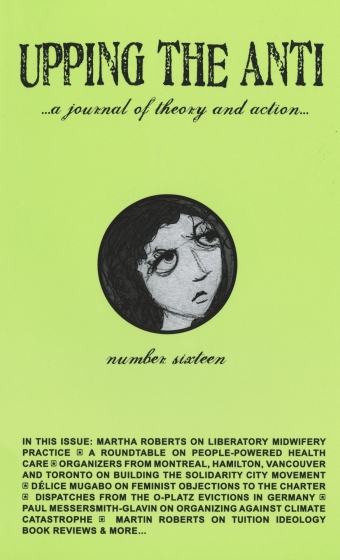Partners in Radical Projects: Thoughts on Activist-NGO Alliances
Dear UTA,
I am writing in response to your interview in Upping the Anti Issue 15 with Kat Stevens, an anarchist and community organizer involved for many years in Tar Sands Blockade organizing in Houston, Texas. While discussing lobbying efforts to combat the Keystone XL pipeline, Stevens characterized mainstream environmental organizations such as 350.org and Sierra Club as “dangerous,” having “[ignored] the root causes of the global climate catastrophe, instead … fighting the symptoms while ignoring the causes” (75). Stevens goes on to argue that much “in the same way that the liberal class acts in order to uphold and protect the status quo, so too do many NGOs” (76).
As an anarchist myself, I share similar frustrations with the reformist mindset of many mainstream environmentalists. Any movement that refuses to condemn capitalism for its instrumental role in the climate crisis is truly “fighting the symptoms while ignoring the causes.” Still, while a healthy distance from mainstream NGOs and activist groups can prevent co-optation and self-defeating compromise, it is just as important to recognize the potential of individual activists within these organizations – both as complex agents of change in their own right, and as partners in more radical projects.
This complexity is well illustrated by Upping the Anti’s recent interview with Brian Tokar, an activist working with 350Vermont. When discussing recent anti-pipeline organizing in the region, Tokar does not fail to link environmental destruction with “capitalism’s need for unlimited growth and expansion.” Tokar also notes that 350Vermont is “considerably more grassroots-oriented than the larger network,” and hopes that it has “helped influence the broader 350 [movement] in a more activist direction.”
It is possible that this last point is overly optimistic, and that Tokar’s radical politics hold true for only a minority of 350’s constituency. Yet this assessment points to a tension between the movement’s superstructure and base – between those who dictate organizational policy and the volunteers and workers who are forced to accommodate it (a tension, moreover, that is discernible in other environmentalist mainstays like Greenpeace and the Sierra Club). And while it is true that NGOs are irreparably compromised by reformism, proximity to power, and pressure from funders and government, if such groups ultimately critique rather than confront the environmental destruction caused by Western capitalism, it is also true that this sector’s workers and volunteers are capable of radical and courageous acts.
Last September, the so-called Arctic 30 were held at gunpoint after boarding a Russian oil rig to protest drilling; they spent almost two months in Russia’s notoriously harsh prison system before a general amnesty was issued. Perhaps predictably, Greenpeace International declined to question the legitimacy of the Russian state’s arrests, instead affirming the rule of law by advocating for a judgment by the European Court. Nevertheless, upon their release, several of the condemned Greenpeace activists pledged to intensify their protests and risk further arrests in an effort to raise awareness about climate change and Arctic drilling. In such cases, direct radical cooperation with NGO activists seems not only possible, but worth pursuing.
Much more is at stake here than the political integrity of environmental NGOs. If Stevens is correct in forecasting an “ecocide for the benefit of capitalist society” – and I agree that NGOs are complicit in this process – building an effective counter-movement is of paramount importance. While working towards this goal, we may be tempted to pre-emptively dismiss NGO environmentalists for affiliating with a highly problematic political project, but in doing so, we would be dismissing potentially crucial allies in the struggle for environmental justice.
In solidarity,
Andrew Winchur
Toronto, ON

